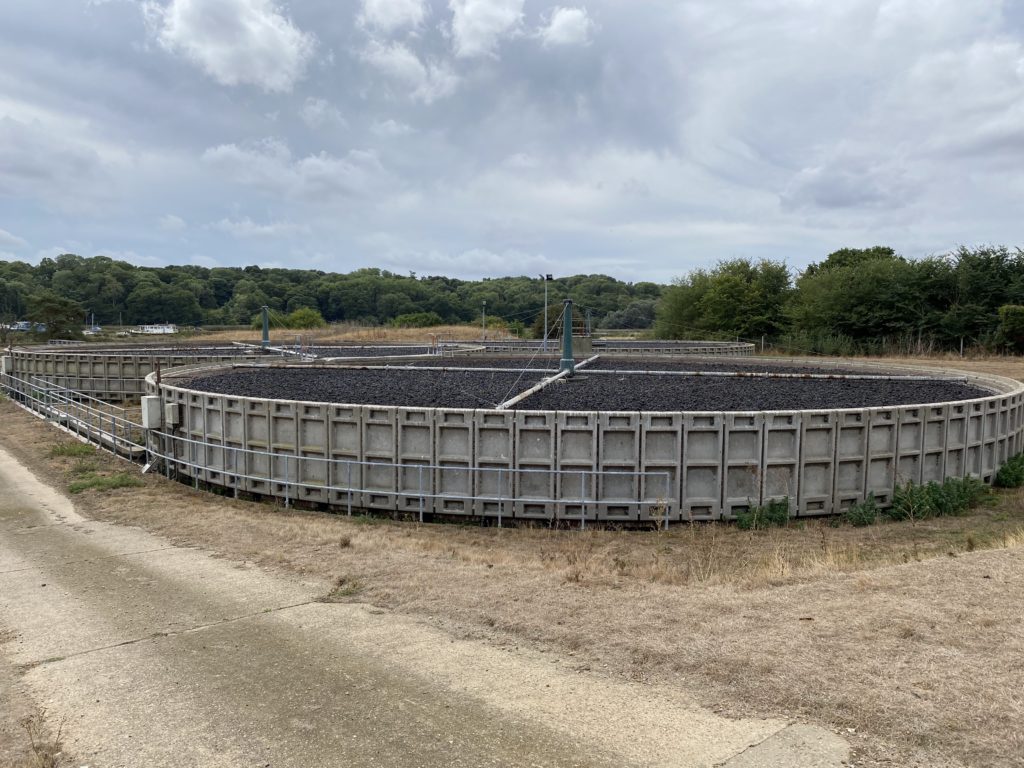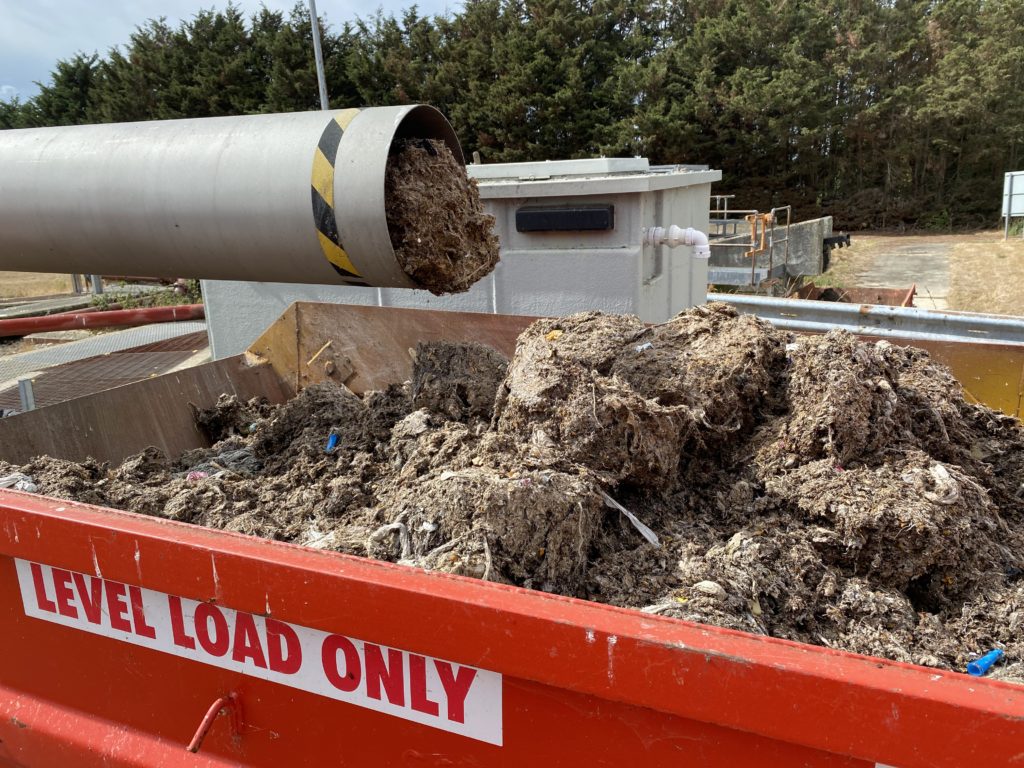By Colin Nicholson
Introduction
At a recent River Deben Association (RDA) committee meeting, co-chair Colin Nicholson reported back from a recent visit to Anglian Water’s Wastewater Treatment Works at Martlesham Creek. The committee felt that this information was likely to be of interest to members and should be reported back. (Minutes of the meeting will also be available on the RDA website when they have been formally agreed.) Hence this article via the RDA Journal, which does not claim to be a complete overview of the complex topic of water quality, merely a personal update on matters of current interest and actions taken to gain better information.
As organic matter trickles down over stones it is consumed by bacteria.
Members of the RDA committee do not serve as experts, but volunteer to gather information from experts on behalf of members and take action when it seems appropriate, bearing members differing interests in mind. We also invite experts to speak to members, as we did at the RDA AGM last April (link) with Andy Went of the Essex and Suffolk Rivers Trust (ESRT) and will do at the forthcoming RDA Autumn Forum with Lord Deben (Chair of the UK’s independent Committee on Climate Change, Seckford Theatre, 8th December 2022: starting at 7pm, doors open 6pm – free to RDA members (bring your membership card,) £5 to non-members).
Sewage spills and water quality monitoring
In the Rivers Trust 2021 report ‘The State of our Rivers’ (link) the River Deben was reported to have a number of sewage spills. Whilst there are many reasons for sewage spillages, such as antiquated infrastructure that combine sewage with rainwater, The RDA is keen to work with Anglian Water and other organisations to understand the baseline quality of our river using robust monitoring techniques. Additional monitoring will help us all understand the nature and extent of any sewage related, and other types of, pollution and assist the authorities to develop appropriate plans to mitigate them.
Anglian Water is also supportive of this goal and agreed to fund regular formalised monitoring at certain key sampling locations which began mid-September, collecting samples to be independently analysed (to avoid any impression of “marking its own homework”). Anglian Water helpfully reached out to the local community to identify these key sampling locations: so, as well as at treatment sites and outfalls, the sampling is taking place popular bathing spots. Anglian Water are keen to use the results to develop an on-line map of river water quality in the vicinity of Woodbridge and elsewhere.
The RDA also welcomes the great efforts being taken by citizen scientists, supported by Woodbridge Town Council and 6-7 Parish Councils to gain initial data (each test costs £1.20) at various points along our estuary and catchment areas. When there is a clear and agreed picture of any issues relating to the Deben, then the appropriate actions can be taken to improve matters and the correct advice given to river users.
Application for Bathing Water Designation
‘Save the Deben’ has undertaken a considerable amount of work over this past summer to apply to DEFRA (the Department of Environment, Farming and Rural Affairs) for Bathing Water Designations at Waldringfield and Woodbridge. Following the 31st October 2022 application deadline, the outcome is now awaited with interest, and is expected early next year. Amongst other organisations, the application was supported by the RDA and Anglian Water. (Anglian Water are also supporting two other Bathing Water Designation applications: on the Cam, South of Cambridge and the River Waveney at Bungay, link).
Meetings with Anglian Water
The River Deben Association, Woodbridge Town Council and ‘Save the Deben’ had three meetings together with Anglian Water during August and September 2022.
In the first meeting, we learnt of the commitment of Anglian Water, through their ‘Get River Positive’ (link) programme commitment to “ensure storm overflows and sewage treatment works do not harm rivers.” Anglian Water also said its ‘Get River Positive’ programme shows it is “focusing on creating a flourishing environment and delivering on the expectations of customers, stakeholders and the environment itself to transform river health across the region.”
Anglian Water’s liaison with local groups is part of their new community engagement strategy, the specific responsibility of a new director-level appointment, Dr Robin Price. Dr Price, director of quality and environment, said: “We want people to know we are listening – as part of ‘Get River Positive’ we’re committed to playing our part in making that happen by ensuring our operations are not the reason for poor river health, but, as importantly, we’ll work to bring the right people together who also have a role to play.”
In the second meeting, the local groups were introduced by Anglian Water to Professor David Kay (Aberystwyth University and Centre for Research into Environment and Health, which is affiliated with the World Health Organisation). Prof Kay was one of the contributors to the EU/WHO Bathing Water Directives. The groups learnt from Prof Kay that there is no standard/safe limit laid down in government legislation for E.coli levels in the output from a Wastewater Treatment Works (WWTWs) and therefore, there is no routine process (known as Tertiary Treatment) targeting E.coli. Current methods would be the use of extensive wetlands or ultra-violet screening of water, the latter of which is hugely energy (electricity/fossil fuel) intensive, thus damaging to the environment, and not a viable way forward in this era of climate change. But the groups learnt that Anglian Water is trialling a novel low-energy Tertiary Treatment method at Southwold WWTW (close to a Bathing Water Designated beach,) using Performic Acid (a variant of the poison produced by ants). Where WWTWs are in the vicinity of a Bathing Water Designated site, this would be a driver for Anglian Water to invest in Tertiary Treatment, which would work to eliminate E.coli. It is hoped that the use of Performic Acid may be an environmentally friendly and viable way forward.
We also benefitted from another interesting piece of information which was shared. This was that learning from German Lake/Coastal data shows that for seawater, only enterococci is a predictor for gastro-enteritis, whereas for freshwater, the best predictor is E.coli. Also, measuring E.coli at a consistent depth is important, as sunlight quickly destroys it in the top 4cm of water. (However, measuring at chest depth is difficult with Health & Safety as testers have to wear life-jackets and undergo training!). There is also some evidence to suggest that E.coli “incubates” in seaweed and the same phenomenon may take place in black cohesive mud, e.g. in estuarine areas like The River Deben and this may contribute to an increase in E.coli concentrations away from the WWTWs.
Unflushables screened out and taken to landfill every two months.
In the third meeting, the local groups were invited to the first community-centric tour of the Woodbridge Wastewater Treatment Works at Martlesham Creek. The facilities are impressive and have to cope with fats/oils/grease and unflushables such as wet-wipes that the general public should not be putting into the system. The site also has 2x storm tanks. These tanks act as a buffer when there is more wastewater to treat than is the capacity of the works. After the storm event has passed, the excess wastewater accumulated in these tanks can subsequently be treated over time alongside normal working, thus avoiding untreated wastewater entering Martlesham Creek. The groups also learnt that untreated sewage sometimes enters water courses as a result of ‘cross-connections’ where toilets have inadvertently been connected to rainwater drainage piping, which can be a significant issue for older towns and villages.
Waste Management from Boats
There appears to be a commitment from Anglian Water to invest, should formal monitoring indicate issues with their facilities. Meanwhile, residential boats are another potential source of pollution although the number of boats is low for the size of the estuary. The April 2015 ‘Deben Estuary Plan’ (adopted by East Suffolk Council) states the following about “Pollution and Waste Management:”
Pollution is caused through the discharge of sewage, paint, oil and other substances from any moored vessel, shed or bunker. This can have a significant negative impact on the estuarine biodiversity, the water quality of the river and the wellbeing of other residents. The discharge of untreated sewage and other wastes directly to the estuary should be avoided.
Excessive input of nutrients (both from sewage and grey water, which can contain pollutants such asphosphates) can change plant and animal communities and reduce water quality within the estuary.
Discharges from sea toilets are not prohibited. However, it is good practice not to discharge a sea toilet where doing so would affect the water quality or harm the amenity value of local waters. It is therefore important to provide adequate facilities for both resident and visiting boats to ensure that the good practice is adhered to. The fitting of holding tanks for boats regularly using inshore waters is encouraged. These should then be discharged well offshore (3 miles) or to the shore through pump-out facilities. Boatyards and marinas should be encouraged to install pump-out facilities, available for the use of boat owners. In the matter of discharge of grey water however, this may be ameliorated through diligent use of ecological washing products and detergents. Marinas and boatyards should provide clean, accessible shore side toilet facilities and washrooms and encourage berth holders to use these facilities whenever possible.
Further publicity about pump-out facilities on The River Deben and the location of shore-based facilities would seem to be a positive step and the RDA will take steps to collate information about this.
Conclusion/The RDA Approach
(as set out in a 29th October 2022 email from Jane Haviland and Colin Nicholson (RDA co-chairs) to ‘Save the Deben,’ in support of the application for bathing water status)
We are all passionate about having a healthy river; we understand that achieving bathing water status will require additional water quality monitoring to be undertaken by the authorities, which we believe is a key step in facilitating us all to achieve and maintain this. The RDA therefore, adds its support to the Designated Bathing Water Status application for The River Deben and when there is a clear and agreed picture of any issues relating to the Deben, then the appropriate actions can be taken to improve matters and the correct advice given to (human) river users.
Colin Nicholson
Colin Nicholson is Co-chair of the RDA. He had a varied career in the international pharmaceutical industry. More recently, Colin worked in sport, as Chief Executive of an Olympic National Governing Body, organising participation in the London Olympics and three Commonwealth Games.


